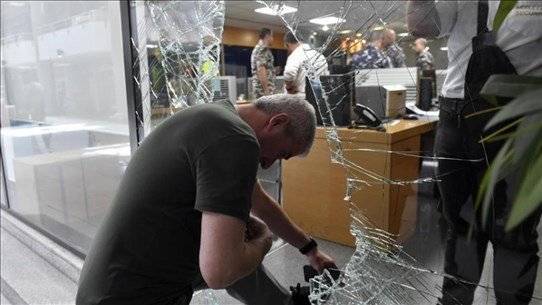The crisis faced by banks and depositors has reached a peak of turmoil, characterized by an increase in armed raids carried out by depositors under pressure due to urgent financial needs, primarily for medical and educational reasons. This situation has compelled the Association of Banks to make a new decision to completely close the administrations and branches for three consecutive days starting next Monday, with further steps to be considered based on developments early next week.
Apart from the purely security dimension that was imposed on many bank branches yesterday, which had previously seen similar individual incidents, general fears have risen about the establishment of a pattern of obtaining rights or needs through self-force and a descent into general chaotic disorder that extends beyond the relationships between banks and depositors, affecting the entire financial and consumer system facing tensions and repeated humiliating queues, starting from flour and bread to the scarcity of diesel fuel and sharp price increases in dollars, along with the continuous closures of fuel stations.
Interior and Municipalities Minister Bassam Mawlawi stated after an emergency meeting of the Central Security Council that "the aim of this meeting is to protect the country and the system, and I address depositors by saying that your rights cannot be retrieved in this manner because it undermines the banking system and leads to the loss of other depositors' rights." He pointed out that "our goal is to protect the country and depositors, and no depositor should be pushed to harm the security situation in the country," emphasizing that "our firmness in security procedures is aimed not at protecting banks but at safeguarding the Lebanese system." Mawlawi added, "There are parties pushing people to take actions against banks, and I cannot disclose details due to the confidentiality of the investigation; we are handling the issue wisely."
The Interior Minister described the current situation as an unhealthy phenomenon, asserting, "We are with the depositors, and it is in their interest to have order in the country, and the measures we will take will be in accordance with the law and the interpretations of the public prosecutor's offices." Regarding the successive security developments inside banks, a senior banking official confirmed that "the official procrastination in approving legislation to establish exceptional controls on capital and transfers (capital control), which includes setting equal shares for available withdrawals and transfers deemed necessary, has effectively produced favorable conditions for increasing the severity of tension in savings management concerning more than two million accounts. This has obliged the central bank to issue a series of regulatory circulars that lack a legal framework to manage decreasing dollar liquidity and limit it to the Lebanese pound, aimed at reducing speculation on the national currency."
With the expansion of campaigns to "demonize" the banking sector and hold it responsible for the liquidity drought being pumped in favor of depositors, it was not surprising, according to the banking official, that the accumulated frustration exploded in the current violent context. The solution, according to the banking consensus in the Association's board of directors, lies in enacting laws that address the crisis as quickly as possible, as addressing an systemic collapse crisis like the one the country is experiencing can only be done through comprehensive plans that consider all causes and address them integratively.
The intentional delays, according to the banking official, extend to the desired recovery plan and the file of final negotiations with the International Monetary Fund. Meanwhile, the authorities have reversed their paths, as we witnessed the previous government hastily deciding, less than 5 months after the outbreak of massive popular movements on October 17, 2019, to default on the payment of obligations due on existing debts in foreign currencies, which led to the exclusion of Lebanon and its institutions from international financing markets. Subsequently, the authorities easily squandered about $20 billion of the central bank's reserves, resulting in a continuous liquidity drought in hard currencies, with the total gradually decreasing from about $32 billion on the eve of exploding crises to critical levels currently reaching about $9.5 billion, according to the latest data from Banque du Liban's balance sheet mid-month.
Concerns are escalating across all sectors regarding the repercussions of continuing the procrastination policy and "leaving things to drift," leading to the dominance of violent equations and mobile security tensions. Consequently, the deliberate neglect of the established truth that the law alone is the protective umbrella equally for individual and institutional rights continues. According to the banking official, no country in the world has neglected legislative and procedural obligations in emergencies and crises as has been the case in Lebanon for three consecutive years. Rather, they are obliged to take preventive initiatives in the early days, exemplified by the immediate legislative measures for monetary controls, which countries like Bangladesh, Cyprus, Greece, and Argentina have implemented in just a few days.




